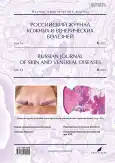Lichen planus and itch-related psychosomatic disorders
- Authors: Dorozhenok I.Y.1,2, Snarskaya E.S.1, Mikhailova M.1
-
Affiliations:
- I.M. Sechenov First Moscow State Medical University (Sechenov University)
- Mental Health Research Center of the Russian Academy of Medical Sciences
- Issue: Vol 24, No 6 (2021)
- Pages: 543-551
- Section: DERMATOLOGY
- URL: https://bakhtiniada.ru/1560-9588/article/view/100612
- DOI: https://doi.org/10.17816/dv100612
- ID: 100612
Cite item
Abstract
BACKGROUND: The relevance of studying psychosomatic disorders associated with itching in patients with lichen planus (LP) is due to a wide range of transnosological comorbidity of nosogenic and depressive disorders with clinical phenotypes of LP.
AIMS: Clinical verification and typological differentiation of psychosomatic disorders associated with itching in accordance with the LP phenotypes we identified in patients of the studied sample.
MATERIALS AND METHODS: 120 patients (77 women and 43 men, average age 47.6±5.2 years) with various LP phenotypes and comorbid psychosomatic disorders associated with itching were examined. Dermatological, using the modern lichen planus area and severity index (LPASI); questionnaire of the severity of itching (behavioral rating scores, BRS), the dermatological quality of life index (DQLI) questionnaire; psychopathological, using the Hospital Anxiety and Depression Scale (HADS); clinical-psychological.
RESULTS: Psychosomatic disorders associated with itching were identified and typologically differentiated in patients with lichen planus: nosogenic reactions that develop in response to manifestations of a skin disease (depressive, sociophobic, beauty hypochondria), as well as recurrent depression. For each type of psychosomatic disorders, different ratios of dermatological and psychosomatic symptoms have been identified. Nosogenic reactions that develop within the considered ratios are comparable to nosogenies in severe somatic diseases and are clinically manifested by anxiety and depressive disorders. In other cases, the key trigger is not the severity of the dermatosis, as in nosogenic depression, but the cosmetically significant localization of the rash. These psychosomatic disorders are represented by sociophobic nosogenic reactions, as well as beauty hypochondria nosogenies, in the formation of which constitutionally determined somatoperceptual accentuations with deformation of the body image make a significant contribution.The role of constitutional factors and somatoperceptive accentuations is determined. The structure of amplified pruritus was analyzed, including the stressful impact of the SARS-CoV-2 pandemic. Methods of effective therapy based on an integrated interdisciplinary approach are presented.
CONCLUSION: Effective diagnosis and treatment of psychosomatic disorders associated with itching contribute to a significant optimization of the course of LP and improve the quality of life of patients.
Full Text
##article.viewOnOriginalSite##About the authors
Igor Yu. Dorozhenok
I.M. Sechenov First Moscow State Medical University (Sechenov University); Mental Health Research Center of the Russian Academy of Medical Sciences
Author for correspondence.
Email: idoro@bk.ru
ORCID iD: 0000-0003-1613-2510
Scopus Author ID: ID: 35773056200;
MD, Cand. Sci. (Med.), Assistant Professor
Russian Federation, 8-2, Trubetskaya street, Moscow, 119992; MoscowElena S. Snarskaya
I.M. Sechenov First Moscow State Medical University (Sechenov University)
Email: snarskaya-dok@mail.ru
ORCID iD: 0000-0002-7968-7663
SPIN-code: 3785-7859
Scopus Author ID: 8714450500
ResearcherId: AAT-5833-2020
MD, Dr. Sci. (Med.), Professor
Russian Federation, MoscowMariana Mikhailova
I.M. Sechenov First Moscow State Medical University (Sechenov University)
Email: Dermatolog003@mail.ru
ORCID iD: 0000-0002-7895-6630
Graduate Student
Russian Federation, MoscowReferences
- Jalenques I, Lauron S, Almon S, et al. Prevalence and odds of signs of depression and anxiety in patients with lichen planus: systematic review and meta-analyses. Acta Derm Venereol. 2020;100(18):adv 00330. doi: 10.2340/00015555-3660
- Sawant NS, Vanjari NA, Khopkar U, Adulkar S. A study of depression and quality of life in patients of lichen planus. Sci World J. 2015;2015:817481. doi: 10.1155/2015/817481
- Smulevich AB, Ivanov OL, Lvov AN, Dorozhenok IY. Psychodermatological disorders. Dermatovenerology. National Guide. Short edition. Moscow: GEOTAR-Media; 2013. Р. 406–413. (In Russ).
- Cassol-Spanemberg J, Blanco-Carrión A, de Rivera-Campillo ME, et al. Cutaneous, genital and oral lichen planus: a descriptive study of 274 patients. J Med Oral Patol Oral Cir Bucal. 2019;24(1):e1–e7. doi: 10.4317/medoral.22656
- Welz-Kubiak K, Reich A, Szepietowski J. Clinical aspects of itch in lichen planus. Acta Derm Venereol. 2017;97(4):505–508. doi: 10.2340/00015555-2563
- Gupta A, Mohan RP, Gupta S, Malik S. Roles of serum uric acid, prolactin levels, and psychosocial factors in oral lichen planus. J Oral Sci. 2017;59(1):139–146. doi: 10.2334/josnusd.16-0219
- Zeidler C, Pereira MP, Huet F, et al. Pruritus in autoimmune and inflammatory dermatoses. Front Immunol. 2019;10:1303. doi: 10.3389/fimmu.2019.01303
- Krajewski PK, Maj J, Szepietowski JC. Cutaneous Hyperaesthesia in SARS-CoV-2 infection: rare but not unique clinical manifestation. Acta Derm Venereol. 2021;101(1):adv00366. doi: 10.2340/00015555-3729
- Snarskaya ES, Dorozhenok IY, Mikhailova MV. Clinical phenotypes of lichen planus and transnosological psychosomatic comorbid states. Medical Alphabet. 2021;(27):26–30. doi: 10.33667/2078-5631-2021-27-26-30
- Dorozhenok IYu, Snarskaya ES, Mikhailova MV. Lichen planus, COVID-19 and depression: psychosomatic correlations. S.S. Korsakov J Neurology Psychiatry. 2022;122(1):110–113. (In Russ). doi: 10.17116/jnevro2022122011110
- Burgos-Blasco P, Fernandez-Nieto D, Selda-Enriquez G, et al. COVID-19: a possible trigger for oral lichen planus? Int J Dermatol. 2021;60:882–883. doi: 10.1111/ijd.15529
- Diaz-Guimaraens B, Dominguez-Santas M, Suarez-Valle A, et al. Annular lichen planus associated with coronavirus SARS-CoV-2 disease (COVID-19). Int J Dermatol. 2021;60:246–247. doi: 10.1111/ijd.15338
- Psychosomatic disorders. A guide for practitioners. Ed. by A.B. Smulevich. Moscow: MEDpress-inform; 2019. 22–23 р. (In Russ).
- Iob Е, Frank Р, Steptoe A, Fancourt D. Levels of severity of depressive symptoms among at-risk groups in the uk during the COVID-19 pandemic. JAMA Netw Open. 2020;3(10):e2026064. doi: 10.1001/jamanetworkopen.2020.26064
- Van Rheenen TE, Meyer D, Neill E, et al. Mental health status of individuals with a mood-disorder during the COVID-19 pandemic in Australia: Initial results from the COLLATE project. J Affect Disord. 2020;275:69–77. doi: 10.1016/j.jad.2020.06.037
- Patrushev AV, Samcov AV, Suharev AV, et al. A new index for assessing the severity of lichen planus in clinical practice. Bulletin Dermatology Venereology. 2020;96(3):27–33. (In Russ). doi: 10.25208/vdv1145
Supplementary files








